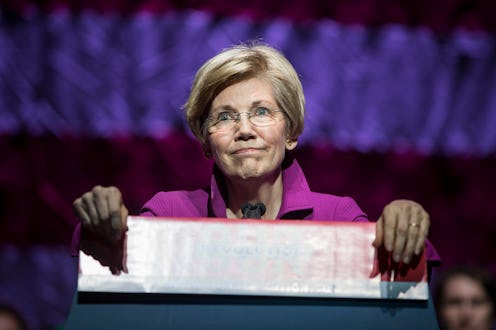News
Elizabeth Warren Shares Why She Didn't Run For President

Massachusetts Sen. Elizabeth Warren came blazing onto the national stage when the Obama administration recruited her in response to the 2008 financial crisis. It didn't take long for her to become known as a fierce critic of Wall Street. Thus, when the Democratic Party was looking for an alternative to Hillary Clinton, who faced heat for allegedly being too cozy with big banks, Warren seemed like an attractive choice, but she wasn't game. Now, Warren explains why she didn't run for president in 2016.
In her latest book, This Fight Is Our Fight, Warren reveals that her family had a lot to do with her decision to decline a run this time around. She was reminded by her husband, Bruce, that “a race like this one looks pretty terrible. The Senate thing was bad enough, and running for president would be worse—a lot worse.’”
Bruce was referring to her hard-fought battle in the 2012 Senate race against Republican Scott Brown. At the time she was the assistant to the president and special adviser to the secretary of the Treasury on the Consumer Financial Protection Bureau. Warren held those roles after her time as a professor of law at Harvard University. She faced a number of stinging attacks from Brown, including that she actively misled people about her Native American ancestry (Warren has stressed that she never pretended to be Native American for personal gains).
In her new book, Warren writes that it wasn't just the grueling campaign that deterred her from running for president. Rather, it was also her current professional obligation. “Talking with Bruce and asking the question out loud had settled it. I wanted to stay buckled down and keep doing my job—my Senate job—as completely and as effectively as I could,” she writes.
It's a decision that has arguably served her well, putting her on the map as a go-to when it comes to her work on the Consumer Financial Protection Bureau and garnering her a solid reputation as a no-nonsense opponent to banking regulators and financial executives.
Moreover, Warren hasn't ruled out the possibility of running for president some time in the future, and she's viewed by many as a solid potential 2020 Democratic nomination. A December 2016 poll from USA Today/Suffolk University found that Democrats gave a Warren presidential run a net positive score of 7 points, not too far behind the 12 points for former Vice President Joe Biden.
However, if Warren makes a 2020 run, she may be closer to another popular Democrat, Vermont Sen. Bernie Sanders. The two are often seen as the face of progressivism in the Democratic Party. Warren's book focuses on the inadequate regulation of big banks and corporations and the devastating effects it has had on middle-class America. It's a message that made Sanders very popular in the last election cycle, and it just might be the ticket for Warren, too.